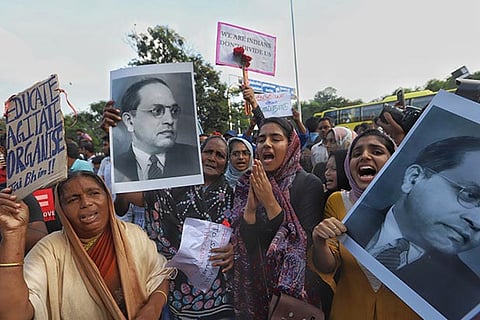

Chennai
At a time when India’s major national priority ought to be cratering economic growth, Prime Minister Narendra Modi’s government has instead plunged the country into a new political crisis of its own making.
With its penchant for shock-and-awe tactics, the government pushed through Parliament a controversial Citizenship Amendment Bill that fast-tracks citizenship for people fleeing persecution in Pakistan, Afghanistan, and Bangladesh – provided they are not Muslim.
By excluding members of just one community, the Bill, which was quickly signed into law by President Ram Nath Kovind, is fundamentally antithetical to India’s secular and pluralist traditions.
As I argued in Parliament, it is an affront to the fundamental tenets of equality and religious non-discrimination enshrined in our Constitution and an all-out assault on the very idea of India for which our forefathers gave their lives.
As India’s freedom struggle neared its goal, Indian nationalists split over the question of whether religion should be the determinant of nationhood.
Those who believed that it should, led by Mohammed Ali Jinnah and his followers, advocated the idea of Pakistan as a separate country for Muslims. The rest, led by Mahatma Gandhi and Jawaharlal Nehru, argued passionately that religion had nothing to do with nationhood. Their idea of India led to a free country for people of all religions, regions, castes, and languages.
The implications – constitutional, political, social, and moral – of the Modi government’s betrayal of this core idea are profound. Under the approved Bill, Muslim immigrants may be declared illegal. Coupled with the government’s plan to create an even more problematic National Register of Citizens, the authorities will be able to disenfranchise any Indian Muslim who is unable to prove his or her provenance in India.
Many Indians, especially the poor, lack documentary evidence of when and where they were born; even birth certificates have become widespread only in recent decades. While non-Muslims would, thanks to the approved Bill, get a free pass, similarly undocumented Muslims would suddenly bear the onus of proving that they are Indian.
This marks a breath-taking departure from seven decades of practice in managing an astonishing degree of cultural diversity. Foreigners – including President George W. Bush – admired the fact that India had produced hardly any Islamic State (ISIS) or al-Qaeda members, despite being home to 180 million Muslims. Indians proudly pointed out that this was because Indian democracy gave Muslims an equal stake in the country’s wellbeing. We can no longer say that.
Democratic India has never had a religious test for citizenship. Muslims have served as presidents, generals, chief ministers and governors of states, ambassadors, Supreme Court chief justices, and captains of national sports teams.
The religious bigotry that led to partition and the establishment of Pakistan has now been mirrored in pluralist India. As I told my fellow parliamentarians, that was a partition of India’s soil; this has become a partition of India’s soul.
Inevitably, mass protests have erupted, particularly in the North-Eastern states bordering Bangladesh, where locals fear being swamped by Bangladeshi Hindu migrants with fast-track citizenship; in West Bengal and Delhi, where Muslims fear that they will be subject to a worsening climate of suspicion; and among Muslims and secularists nationwide. Though the protests have been mostly peaceful, the authorities have responded with force.
Four demonstrators have been shot dead in Assam (and two more killed in the chaos), curfews have been imposed, police have invaded universities, and Internet and telephone services have been suspended in some areas.
Over 100 people have been injured. This self-inflicted wound will take a long time to heal. In his first term in office, Modi attempted to create a more unabashedly Hindu India, but one that was still attractive to global investors.
Six months into his second term, he seems to have given up on the latter goal. As foreigners recoil with horror at the blatant Islamophobia on display from the highest echelons of Modi’s Bharatiya Janata Party, he has focused on criminalising the triple-talaq form of Islamic divorce, pushing for a Hindu temple on a site where a 470-year-old mosque was demolished in 1992 by Hindu protesters, and changing the constitutional status of Muslim-majority Jammu and Kashmir and detaining its political leaders. The new citizenship law is just one more brick in an edifice of official bigotry.
It is an edifice that is leaving India increasingly isolated. Japanese Prime Minister Shinzo Abe promptly cancelled a visit to India following the citizenship Bill’s enactment, as have two Bangladeshi Ministers.
Foreign investors have already been withdrawing, thanks to Modi’s mismanagement of the economy, which has never recovered from the disastrous blows of an irresponsible demonetisation exercise and the botched implementation of a nationwide Goods and Services Tax.
Banks are weighed down by bad debt, the public sector is haemorrhaging money, automobile factories are closing, unemployment is at a 46-year high, and farmers are committing suicide in record numbers.
Now, the Modi government has compounded its economic fecklessness with political recklessness, plunging India into turmoil. The combination of ineptitude and bigotry that has laid the country low has left long-time admirers of the Indian model speechless in disbelief.
With the government on the warpath against the fundamental assumptions of the Indian republic, the unspoken fear among the country’s democrats is that the worst is yet to come.
Shashi Tharoor, a former UN under-secretary-general and former Indian Minister of State for External Affairs and Minister of State for Human Resource Development, is an MP for the Indian National Congress
Copyright: Project Syndicate, 2019
Visit news.dtnext.in to explore our interactive epaper!
Download the DT Next app for more exciting features!
Click here for iOS
Click here for Android